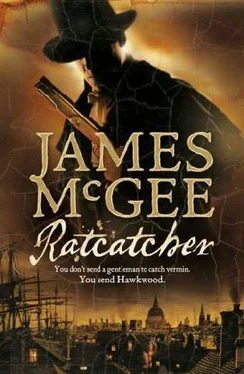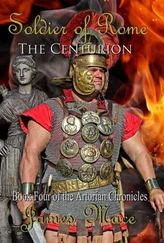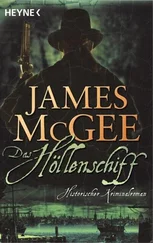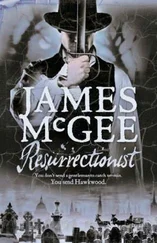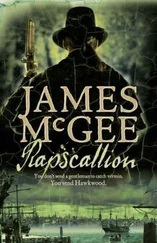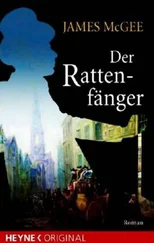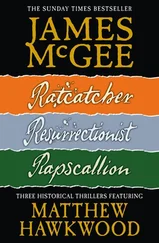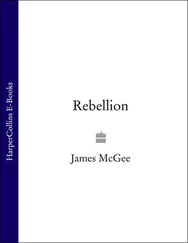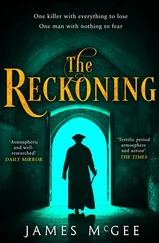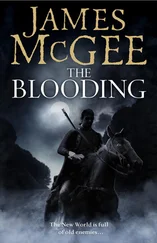James McGee - Ratcatcher
Здесь есть возможность читать онлайн «James McGee - Ratcatcher» — ознакомительный отрывок электронной книги совершенно бесплатно, а после прочтения отрывка купить полную версию. В некоторых случаях можно слушать аудио, скачать через торрент в формате fb2 и присутствует краткое содержание. Жанр: Исторический детектив, на английском языке. Описание произведения, (предисловие) а так же отзывы посетителей доступны на портале библиотеки ЛибКат.
- Название:Ratcatcher
- Автор:
- Жанр:
- Год:неизвестен
- ISBN:нет данных
- Рейтинг книги:4 / 5. Голосов: 1
-
Избранное:Добавить в избранное
- Отзывы:
-
Ваша оценка:
- 80
- 1
- 2
- 3
- 4
- 5
Ratcatcher: краткое содержание, описание и аннотация
Предлагаем к чтению аннотацию, описание, краткое содержание или предисловие (зависит от того, что написал сам автор книги «Ratcatcher»). Если вы не нашли необходимую информацию о книге — напишите в комментариях, мы постараемся отыскать её.
Ratcatcher — читать онлайн ознакомительный отрывок
Ниже представлен текст книги, разбитый по страницам. Система сохранения места последней прочитанной страницы, позволяет с удобством читать онлайн бесплатно книгу «Ratcatcher», без необходимости каждый раз заново искать на чём Вы остановились. Поставьте закладку, и сможете в любой момент перейти на страницу, на которой закончили чтение.
Интервал:
Закладка:
Not that Hawkwood had ever viewed himself as the marrying kind. Hearth and slippers? He didn’t think so. It wasn’t in his nature. It might have suited someone like Runner Warlock, but Hawkwood valued his independence too much. So he had taken his pleasure as and when it became available, mostly with molls. There were always willing participants to be found among the better Covent Garden establishments, but they were fleeting liaisons of little consequence. So, now and again, when the mood took them, Hawkwood and Maddie Teague would seek each other’s company and, for a short while, perhaps a night or two, they would take comfort in each other’s embrace and try to keep the loneliness at bay.
Hawkwood took a slow sip of coffee and surveyed the scene and tried to put the thoughts of the two contrasting women out of his head. As if he didn’t have enough to contend with.
A low hum of conversation filled the tavern. There was the usual mix. Several lawyers, a few of whom Hawkwood knew by name, a smattering of clergy, and a brace of welldressed individuals who could have been either bankers or doctors. Candlelight created strange moving shadows in the oak-beamed room. The atmosphere was relaxed and cordial.
Warlock’s baton lay on the table at Hawkwood’s right elbow. It looked decidedly out of place. There had been a clumsy attempt to clean its pitted surface, but traces of dried mud could still be seen engrained in the grip and on the small brass crown at the tip. Hawkwood picked it up and hefted it in his hands. There was something about the baton, the weight and feel, that was strangely comforting. A Runner’s baton was a measure of the man who carried it. It gave him great authority: the power to search, to seize, to interrogate and to arrest, a right granted to very few officers, less than the number that could be counted on the fingers of two hands. It was privilege hard earned, often feared, and much envied.
Thoughtfully, Hawkwood held the stem of the baton in his left hand. Then, clasping the tip in his right hand, he gripped hard and twisted.
At first nothing happened. He tried again, with the same result. It was only after he had smeared the join liberally with grease from his discarded plate that the two halves of the tipstaff came grudgingly apart.
To the uninitiated, a Runner’s baton was a solid wooden club. In fact, it was hollow. It was here that a Runner carried his sealed warrant. Signed by the Chief Magistrate, the warrant was a further symbol of his authority as well as proof of identification.
Warlock’s warrant, Hawkwood saw with some surprise, was still in place. Carefully, he drew it out. As he did so, he realized the warrant was not the only item concealed within the ebony shaft. Wrapped within the furled document were two wafer-thin pieces of onion-skin paper. Frowning and laying the warrant to one side, Hawkwood smoothed them out.
Drawings. Hawkwood peered closer. No, not drawings, something else. They looked like plans.
The first one appeared to show the workings of some kind of mechanical device. There was a four-sided casing, one corner of which was curved. Inside the casing, several long spindles were connected to a series of interlocking cogs of various sizes. There were also two objects that looked like cotton spools, and a flywheel at top and bottom, one large and one small.
Mystified, Hawkwood turned the sketch around until the curved corner was at the top left of the drawing. A thought struck him. He’d seen similar sketches before, on the walls of Josiah Woodburn’s workshop.
The second sketch was even more intriguing, though less illuminating. It showed the outline of what looked to be another container, this one square in shape, divided into two halves. There was no mistaking the object contained in the top half of the square. It was the firing mechanism of a gun: hammer, jaws and flint, spring and firing pin. The bottom half of the square was also divided in half. In the left-hand compartment, directly under the hammer of the gun, was a cogwheel, connected to the hammer by a thin, curved, incisorshaped object. The head of the incisor was hooked under the back of the hammer head. The point of the incisor rested in a space between two of the cogwheel’s teeth. The right-hand compartment was empty.
Hawkwood sat back. If he were to hazard a guess, he’d have said the larger sketch showed the working parts of a clock while the smaller of the drawings looked to be some kind of timing device. He considered the possibilities. Could they be the plans for a new type of timepiece? Woodburn was an acknowledged master of his craft. Perhaps this was some sort of revolutionary winding mechanism, something he wanted to keep secret from rival clockmakers. If that was so, how did it fit in with his disappearance? And what about the other components, the hammer and flint? Hawkwood stared at the images before him. Whatever they represented, Warlock, at least, had considered them important enough to warrant concealment from prying eyes. But that begged another question: from whom had they been concealed?
A smudge at the bottom right-hand corner of one of the sketches caught Hawkwood’s eye. He leaned forward, reached for the candle and held it over the paper, careful not to let any of the wax drip.
Writing, barely legible.
Hawkwood put the candle-holder on the table. Lifting the paper, he held it up and angled it towards the light. The letters remained obstinately faint, as if the ink had run. Two words. The penmanship left a lot to be desired. Possibly the words had been written under duress, or in a hurry. Hawkwood moved the paper closer to the flame.
There was a T, most definitely, followed by what could be an h. The e was more clearly defined: The.
Another t, followed by i, followed by an s.
Two words, one of them incomplete, with no discernible meaning. Hawkwood sat back and frowned.
The striking of the tavern clock brought him out of his trance. It was half past seven. The Bow Street Public Office closed at eight. Hawkwood knew, however, that in one room at least the candles would continue to burn brightly. He rolled up the sketches and replaced them inside the baton. Yet again he would have to delay his attempt to contact Jago. It was time to report back to James Read. Two heads were supposed to be better than one. It seemed an ideal opportunity to put the theory to the test.
It occurred to Hawkwood that throughout his period of service at Bow Street he must have been privy to every permutation of mood change the Chief Magistrate had to offer. Anger, frustration, irascibility, sarcasm, amusement, and, on the odd occasion, even the depths of despair. The one thing he had never witnessed, however, had been James Read’s inability to produce speech. Until now.
The look on the Chief Magistrate’s face as he removed the sketches from Warlock’s tipstaff would remain for ever etched in Hawkwood’s brain. James Read sucked in his breath and paled as the full details of the drawings came to light. Hawkwood could not recall seeing the man so profoundly shaken. After what seemed an age, the magistrate raised his head.
“I want you to describe exactly how you came by these. I urge you to leave nothing out-nothing.”
As Hawkwood spoke, the Chief Magistrate listened in silence. Not once did Read’s piercing blue eyes leave the Runner’s face. When Hawkwood had given his account, James Read continued to stare down at the drawings.
Hawkwood, unable to curb his impatience, broke the silence. “What are they?”
Without looking up, Read said, “It is my belief they are the former contents of the dispatch pouch stolen from the navy courier murdered during the mail coach hold up on the Kent Road.”
The room turned as cold and as quiet as a tomb. “I don’t understand,” Hawkwood said. “What the hell does a navy courier have to do with clocks?”
Читать дальшеИнтервал:
Закладка:
Похожие книги на «Ratcatcher»
Представляем Вашему вниманию похожие книги на «Ratcatcher» списком для выбора. Мы отобрали схожую по названию и смыслу литературу в надежде предоставить читателям больше вариантов отыскать новые, интересные, ещё непрочитанные произведения.
Обсуждение, отзывы о книге «Ratcatcher» и просто собственные мнения читателей. Оставьте ваши комментарии, напишите, что Вы думаете о произведении, его смысле или главных героях. Укажите что конкретно понравилось, а что нет, и почему Вы так считаете.
